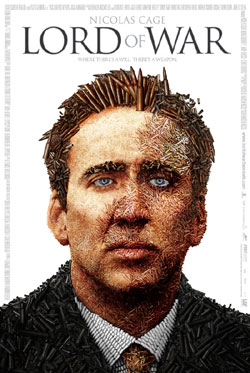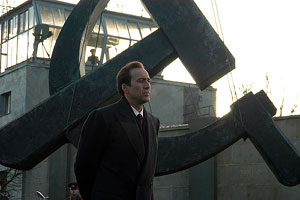 Andrew Niccol’s new film, Lord of War, opens with Nic Cage standing a street that is paved with bullets. That’s just the first striking image in a film filled with them, a film that tries to open our eyes to the world of international arms dealing. The guys who do this operate both legally and illegally, and they are responsible for some of the worst violence on the planet.
Andrew Niccol’s new film, Lord of War, opens with Nic Cage standing a street that is paved with bullets. That’s just the first striking image in a film filled with them, a film that tries to open our eyes to the world of international arms dealing. The guys who do this operate both legally and illegally, and they are responsible for some of the worst violence on the planet.
Niccol’s probably hoping that this film does better than his last two – the very excellent but criminally unseen Gattaca and the less said about it the better S1m0ne. With Cage starring it has a shot, and hopefully America is looking for a dense and smart film after yet another fluffy summer.
Last week I spoke with Niccol on the phone. The New Zealander sounded tired, but was hapy to talk about the film and his past work, including his screenwriting work on The Truman Show, the movie that probably changed Jim Carrey’s career.
Lord of War opens everywhere this weekend.
Q: After watching Lord of War I felt like it was a film in the tradition of Goodfellas and Blow. Were those films influential for you?
Niccol: Not intentionally, but I can see the similarities. It’s interesting, in some ways one of the things that drew me to this projects is that there is so much attention paid to drug trafficking, yet arms trafficking has so much more of a deadly impact on the world, yet there’s very little attention paid to it.
Q: You make a point in the film of saying that while the Nic Cage character isn’t based on any one person, the events of the story are based on true events. What kind of research did you do for this project?
Niccol: I had to use real gunrunners in the making of the film, just to supply the weapons. All the tanks that you see belong to one man in the Czech Republic, one arms dealer. He said to me, ‘You can have these until December but I need them back because I am selling them to Libya.’ And when Nicolas Cage’s character was walking through the armory, those are all real AK-47s, because it was cheaper to use real guns than fake guns. We bought 3000 real AK-47s.
 Q: And what did you do with them when the film was done?
Q: And what did you do with them when the film was done?
Niccol: It was just an elaborate rental in some ways – we sold them back at a reduced rate. But it shows you how available these things are.
Q: The real arms dealer that you got the tanks from, was he aware of the kind of movie you were making?
Niccol: I don’t know if he had read the script or not, actually. That’s a good question. If he saw it as an indictment against arms dealers, he would probably say ‘That’s not me, I’m not that kind of arms dealer.’ It’s why it’s so hard to combat this. You never know if these guys are doing legitimate deals or illegitimate deals.
Q: One of the interesting parts of the film is where you take a very specific and vocal stance on the US’s involvement in international arms dealing. Do you expect to take any flak for that?
Niccol: I’m not sure it is a stance, because it’s just the truth. It’s just a fact that the US is far and away the biggest supplier of arms in the world. I don’t think that’s political because it’s the truth. If the truth is political, it’s political. It’s also not even a partisan issue, because the US is still the biggest supplier if Bush is president or if Clinton is president. It just makes a lot of money for a lot of people so it keeps going.
Q: Well it’s one of those dirty secrets that people don’t like having out there.
Niccol: It’s dirty, but it shouldn’t be a secret! [laughs] That’s just an absolute documentable fact. Why not shine some light on that?
Q: You shot much of this film in South Africa. What made you head down there?
Niccol: South Africa had to stand in for 13 different countries. It had all of the landscapes I needed, it had all the extras I needed, since a lot of the film is based in Africa. And it had the exchange rate that I needed to make it affordable.
Q: Did you visit some of the war torn parts of Africa?
Niccol: I’ve never been to West Africa. North Africa I’ve been to, but not to strictly research the film.
Q: I understand that you really were after Nic Cage to star in this film. What was it about him  that you wanted?
that you wanted?
Niccol: I thought that Nicolas Cage could make the devil charming. I think there’s no one better at doing that. And he has this sort of in-built irony that would make you like that character.
Q: One of the other interesting things about the film is that you have a really kinetic style, and the film is engaging all the way through, but it’s not an action film per se. Do you think that people will be expecting a bigger action bang for their buck? Do you think it’s being marketed properly?
Niccol: I’m not sure. I haven’t seen all the advertising that’s out there, so I don’t know if it’s false advertising. It can’t truly be an action film because these guys aren’t the guys who pull the trigger, which is what they use in their defense. I would imagine that Nicolas Cage’s character arrives five minutes before a battle or five minutes after, but he’s never there when it actually happens.
Q: You’ve been steeped in the world of gun running. Is there anything that can be done besides hoping that these guys suddenly grow a conscience?
Niccol: It’s very difficult to stop something that makes so much money for so many people. The only way people can do anything about it is by making it an issue. We are arms dealers ourselves in a way because we benefit from the sale of arms in the United States. We’re complicit and if we tolerate our government making that money and that’s what’s paving our roads, and if there’s no outrage about it, then we’re oddly enough participating in it.
Q: For people who are familiar with your earlier work, this could be seen as a departure. You wrote The Truman Show, which has a sci-fi element, you directed Gattaca, which is very sci-fi, and you also directed S1m0ne, which has sci-fi at its heart. Were you seeing yourself as someone who was working in that field, or was that something that just shook out that way?
Niccol: You’re smart to say that’s the way it shakes out. Most people, although they like to pigeon-hole you, they only see the work that is produced, and if you’re lucky to get that kind of work produced and they don’t see the other work that you do – and this is an example of the other kind of work. I’ve gone to the near future and here I’ve gone into the recent past. I don’t try to restrict myself in any genre.
Q: Gattaca was fairly well received by critics, but S1m0ne wasn’t. What happened? Was it the film or was it that the critics weren’t receptive to your criticism of the industry?
Niccol: It may be a case of biting the hand that feeds. The interesting thing is that Gattaca initially wasn’t well received in America, but it was well received in Europe. S1m0ne was better received in Europe as well. Now Gattaca’s come back to America, and now it’s achieved some kind of cult status in America. It’s interesting how long a film takes before you can write the reviews for it. They’re re-releasing Gattaca on DVD and it’s many years later, and it’s refreshing if your film can stand the test of time like that.
Q: I didn’t know that about a new Gattaca DVD. As you said, many people discovered that film on video and DVD, so you have a big audience for this. What can they look forward to on the DVD – will you be doing a commentary, will there be extra scenes?
Niccol: Ethan Hawke and Jude Law will be doing commentaries on it. It hasn’t been completely finalized, but it will come out.
Q: You’re on the last legs of the marathon that is getting a film into theaters. Are you thinking ahead to your next project, or are you just taking it easy until you’re done talking about this movie?
 Niccol: I’m always thinking about what’s next, but it’s a challenge to always get my movies off the ground because I tend to have expensive ideas that are somewhat unconventional, and that’s the worst combination in Hollywood.
Niccol: I’m always thinking about what’s next, but it’s a challenge to always get my movies off the ground because I tend to have expensive ideas that are somewhat unconventional, and that’s the worst combination in Hollywood.
Q: That was what did you in with Truman Show, isn’t it? You had wanted to direct that but the studio felt it was too expensive to give to you.
Niccol: I made the mistake of writing my most expensive film first.
Q: Are you happy with how that film turned out, or would you have done it differently?
Niccol: I would have done it different, but Peter’s vision is just as valid. It’s just the luck of the draw really. You have two choices – you can either wash your hands of a project when someone else is directing or you can embrace that vision, and I chose to embrace it and tried to get as many of my ideas in the film as possible.
Q: What happened with The Terminal? You had written some drafts of that before Spielberg came on? I’m not sure how that worked.
Niccol: It was my original story and then I realized I didn’t want to write it or even direct it, because I felt like it was ground I had already covered on The Truman Show. It was another confined world and another sort of prisoner in paradise. I felt it was better if someone else took a crack at it, as they would bring something different.
Q: You’re willing to have your scripts end up in somebody else’s hands if that’s what happens, or are you adamant about directing your own scripts?
Niccol: I always write with a view to directing, but that particular story idea, as I said, the reason why I didn’t write a screenplay for it, is that I felt like I had covered that ground before. I’m always looking to direct what I write.